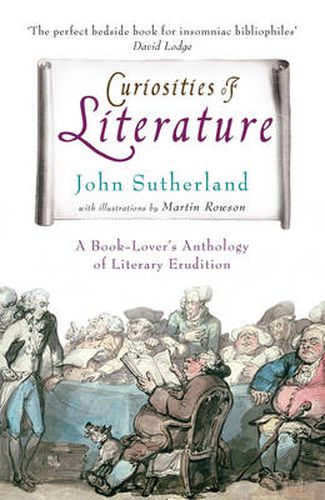Readings Newsletter
Become a Readings Member to make your shopping experience even easier.
Sign in or sign up for free!
You’re not far away from qualifying for FREE standard shipping within Australia
You’ve qualified for FREE standard shipping within Australia
The cart is loading…






How much heavier was Thackeray’s brain than Walt Whitman’s? Which novels do American soldiers read? When did cigarettes start making an appearance in English literature? And, while we’re about it, who wrote the first Western, is there any link between asthma and literary genius, and what really happened on Dorothea’s wedding night in Middlemarch? In Curiosities of Literature, John Sutherland contemplates the full import of questions such as these, and attempts a few answers in a series of essays that are both witty and eclectic. His approach is also unashamedly discursive. An account of the fast-working Mickey Spillane, for example, leads to a consideration of the substances, both legal and illegal, that authors have employed to boost their creative energies. An essay on good and bad handwriting points out in passing that Thackeray could write the Lord’s Prayer on the back of a stamp. As for Mary Shelley, a brief recital of the circumstances in which she wrote Frankenstein stops off to consider what impact the miserable summer weather of 1816 had on the future path of English literature. Of course, it is debatable whether knowledge of these arcane topics adds to the wisdom of nations, but it does highlight the random pleasures to be found in reading literature and reading about it. As John Sutherland rightly asks, ‘Why else read?
$9.00 standard shipping within Australia
FREE standard shipping within Australia for orders over $100.00
Express & International shipping calculated at checkout
How much heavier was Thackeray’s brain than Walt Whitman’s? Which novels do American soldiers read? When did cigarettes start making an appearance in English literature? And, while we’re about it, who wrote the first Western, is there any link between asthma and literary genius, and what really happened on Dorothea’s wedding night in Middlemarch? In Curiosities of Literature, John Sutherland contemplates the full import of questions such as these, and attempts a few answers in a series of essays that are both witty and eclectic. His approach is also unashamedly discursive. An account of the fast-working Mickey Spillane, for example, leads to a consideration of the substances, both legal and illegal, that authors have employed to boost their creative energies. An essay on good and bad handwriting points out in passing that Thackeray could write the Lord’s Prayer on the back of a stamp. As for Mary Shelley, a brief recital of the circumstances in which she wrote Frankenstein stops off to consider what impact the miserable summer weather of 1816 had on the future path of English literature. Of course, it is debatable whether knowledge of these arcane topics adds to the wisdom of nations, but it does highlight the random pleasures to be found in reading literature and reading about it. As John Sutherland rightly asks, ‘Why else read?